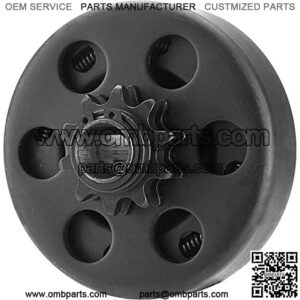Why Does Your Go-Kart Clutch Smoke?
Any part of a go-kart’s engine with smoke coming from it should be a cause of concern. The reason for driving a go-kart is to smoke everyone around the track, not watching it smoke. Ever heard the following “where there’s smoke, there’s fire”? In this article, we will search for the source of the fire.
Prolonged Engagement Of The Clutch Without Locking
A certain rpm is required to engage the weights to the clutch bell housing. For most clutches, it occurs somewhere between 1800-2000 rpm. The engine must move through this level of rpm, get the clutch pack to stick, and finally engage to the clutch bell’s walls.
If the clutch is engaging but cannot grab fully, the clutch will start to smoke due to this prolonged engaging. Prolonged engagement will damage the weights to such a degree that they will continuously slip and lead to cracking and breaking apart.
Prolonged Engagement Occurs When:
1) The go-karts engine is not powerful enough to get beyond the engagement stage:
- This could be the result of a mismatch in ratios to the rear-drive wheels.
- When this ratio is not steep enough, the engine will smoke the clutch.
- Another possible issue is if the clutch is made to engage at a lower rpm than the engine can grab at.
2) The clutch weight rpm is not enough:
- When the clutch rpm never reaches the engagement speed, it may be in the neighborhood of the engagement speed, but it is not high enough above the engagement speed to get a lock.
How To Prevent Prolonged Engagement?
A possible remedy to fix this problem is to alter the driveline, making the overall ratio steeper. The simplest way to do this is to increase the rear sprocket diameter. Often, what happens is that using a one ratio system will not be enough to increase the horse-power ratio required. A jackshaft system will be required, essentially making it a two-ratio system, to provide a steeper ratio.
Mismatched Jackshaft Systems
Never reaching the required engagement speed will smoke the clutch and is prevalent in mismatched jackshaft systems.
If your go-kart has a jackshaft installed, check that the setup was done correctly:
- The clutch should not be installed on the driver of the jackshaft, with a ratio in front of it.
- This setup will rotate the clutch too slowly, even when the overall ratio is correct.
The clutch engagement rpm must be taken into account. Otherwise, the clutch will smoke on the secondary jackshaft’s mounting position. If the clutch is not engaging due to too little horse-power, or too slow clutch speed, you will need to change the system by altering the ratios in front or behind the clutch.
If the clutch is not engaging due to:
- Too little horse-power
- Clutch speed being too slow
The system needs to be changed by altering the ratios in front or behind the clutch system.
Too Much Sprocket Teeth
Go-kart clutches use internally mounted weights inside the clutch. The weights fling out and press against the clutch bell housing, after which the bell housing moves the sprocket, driving the sprocket teeth. A typical clutch has 10-12 sprocket teeth. When a clutch has more than 12 sprocket teeth, it will probably give some trouble regarding the drive train, usually in the form of overheating and smoke.
Oil Inside The Clutch
Oiling your clutch is something that you need to do often. It is an essential maintenance procedure that needs to be adhered to when looking after your special go-kart.
Ensure to oil the internal bronze bushing located behind the snap ring, next to the sprocket teeth, at the end of the clutch. Ensure to oil this bushing after every hour you have driven, allowing the oil to penetrate the bushing by waiting a few minutes before driving.
Make sure to never put oil on the inside of the clutch! The holes on the drum are there for the simple reason of letting hot air out of the clutch. It is not an area where you want to put oil in, as this will generally lead to a lack of friction between the flyweights and the drum, which will cause slippage, generating excessive heat in the clutch.
Improperly Installed Clutch
Installing the clutch properly on the engine crankshaft requires using the correct length key and not pounding it on the shaft with your “magic hammer.” If the clutch is not installed correctly using the right tools and directions, it could lead to your clutch smoking, lasting only a few minutes instead of several years.
Using Big Tyres On Your Kart
Go-karts with rear tires taller than 15-inches, or an engine larger than 8-horse power will require a torque converter. Using too big tires can burn out a clutch in seconds. If you are using big tires, you will need more teeth on the axle sprocket. Ensure that the setup gear ratio is correct regarding the size of your tires and the teeth of the axle sprocket.
Driving Too Slow
When a first-time go-kart owner sees smoke coming out of the clutch, they might think it’s because they drove full-throttle for too long, when the opposite is true.
Driving your go-kart in too slow a fashion could be the reason your clutch is smoking. A clutch will start to engage at around 2,000 rpm and lock up at approximately 2,600 rpm. Driving your go-kart at full throttle locks the shoes in the clutch against the clutch drum. When the clutch is not locked, the shoes slip against the drum and cause tremendous heat, drying up the lubrication in the oil bushing.
The intense heat can also anneal the spring, which is the heart of the clutch. When the shoes turn a purple color from the excess heat, the clutch is likely ruined, losing the ability to pull back the shoes when idle. The longer you drive at top speeds, the better it is for the clutch, as this will give it time to cool off before the next engagement.

